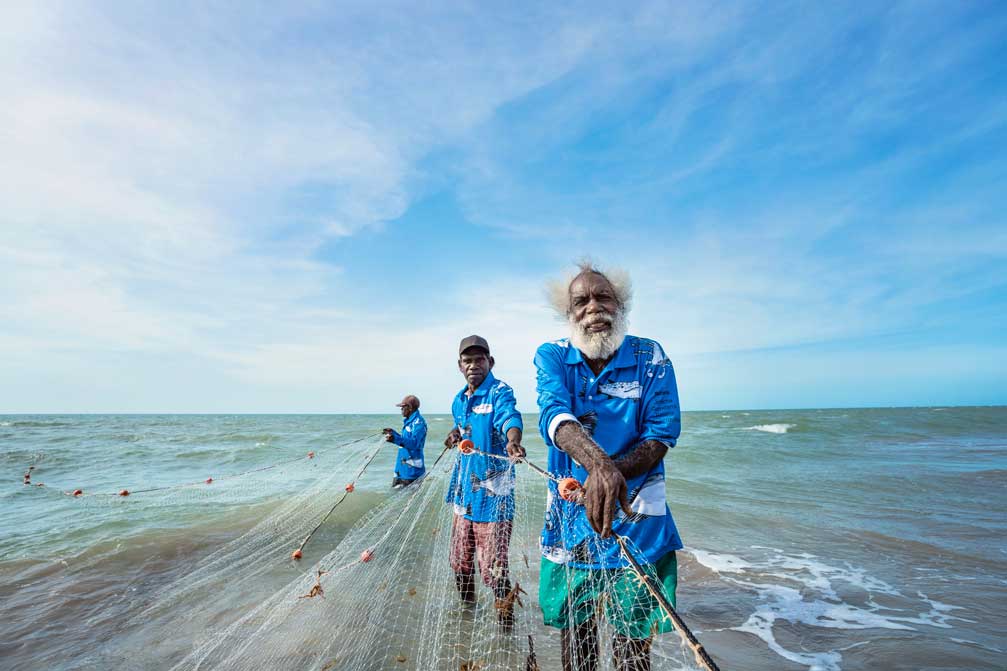Land and Sea
The Land Rights Act and the Native Title Act provide the legislative foundations of Aboriginal land and sea ownership in the Northern Territory.
Approximately 48% of the Northern Territory’s land mass and 80% of its coastline is Aboriginal land subject to the Land Rights Act.
The majority of the remaining land and waters are, or are likely to be, subject to native title.
-
The Kenbi Land Claim – which has been ongoing since 20 March 1979 - was finalised on 5 December 2024, with the Australian and Northern Territory governments handing back the last parcels of land on the Cox Peninsula to the Kenbi Land Trust and the Larrakia Development Corporation.
This historic moment is a tribute to the ongoing collaboration between the Northern Territory and Australian Governments, the Northern Land Council, the Larrakia people and Traditional Owners to resolve complex issues.
All land granted on the Cox Peninsula and nearby islands includes to the low tide mark.
As part of the hand back, the NT Government has secured ongoing public permit-free access to the intertidal zone between the high and low tide to support the Territory’s outdoors lifestyle.
Restricted areas on the Cox Peninsula coastline and nearby islands to protect sacred sites were put in place in 2016. There are no new restrictions on the northern Cox Peninsula areas granted today.
Use of roads and the track to the WWII Bomber site will continue without a permit.
Camping is permitted on the Cox Peninsula in designated camping areas only.
The NT Government will work closely with the Northern Land Council and Traditional Owners to develop additional designated camping areas along the newly granted northern beach areas.
Finalisation of the Kenbi Land Claim is a positive step for the Aboriginal landowners to progress commercial and land management initiatives for economic development and cultural outcomes.
For more information, and latest access maps visit the Northern Land Council website
-
The NTG has developed a Town Lands Native Policy to equip native title holders with more control and flexibility in managing their land.
Native title holders can now apply to convert exclusive native title land within towns to freehold title, without extinguishing their native title rights.
For a freehold title to be granted, an Indigenous Land Use Agreement must be signed by the Registered Native Title Body Corporate, relevant Land Council and the NTG.
Once a freehold title is granted, the owner can hold onto it, subdivide it, lease it, mortgage it to raise finance or sell it. The granted title will still be subject to exclusive native title rights, but those rights will be fully suppressed and will have no force or effect for the life of the freehold
Grant and any subsequent titles.The Policy will help native title holders to develop their land without having to extinguish their hard-fought native title rights forever.
Download:
Town Lands Native Title Policy PDF (567.5 KB)
Information for Native Title Holders and PBCs PDF (161.5 KB)
-
In October 2021 the NTG Cabinet endorsed the National Guiding Principles for Native Title Compensation Agreement Making (The Guiding Principles).
The Guiding Principles received in-principle endorsement by all Commonwealth, state and territory ministers responsible for native title at the Native Title Ministers Meeting on 15 October 2021.
At the Native Title Ministers Meeting, Ministers acknowledged the transition of the native title system towards a post-determination landscape, with a greater focus on supporting native title holders to manage and use their native title rights and on resolving native title compensation.
In light of this, and with regard to the upcoming 30th anniversary of the Mabo decision on 3 June 2022, the ministers endorsed the National Guiding Principles.
The principles are not binding on parties but they aspire to best practice, a consistent national approach, and reaffirm that governments will use their best efforts to settle native title compensation matters by negotiation and agreement, where possible, rather than litigation. They include principles
that support:- fairness, self-determination
- free, prior and informed consent
- good faith negotiations
- consideration of the aspirations of native title parties, and
- consistency within and across jurisdictions in assessing, valuing and resolving native title compensation.
These principles now form the core of the NTG’s approach to native title compensation agreement making.
Read the National Guiding Principles for Native Title Compensation Agreement Making - Preamble PDF (186.9 KB)
